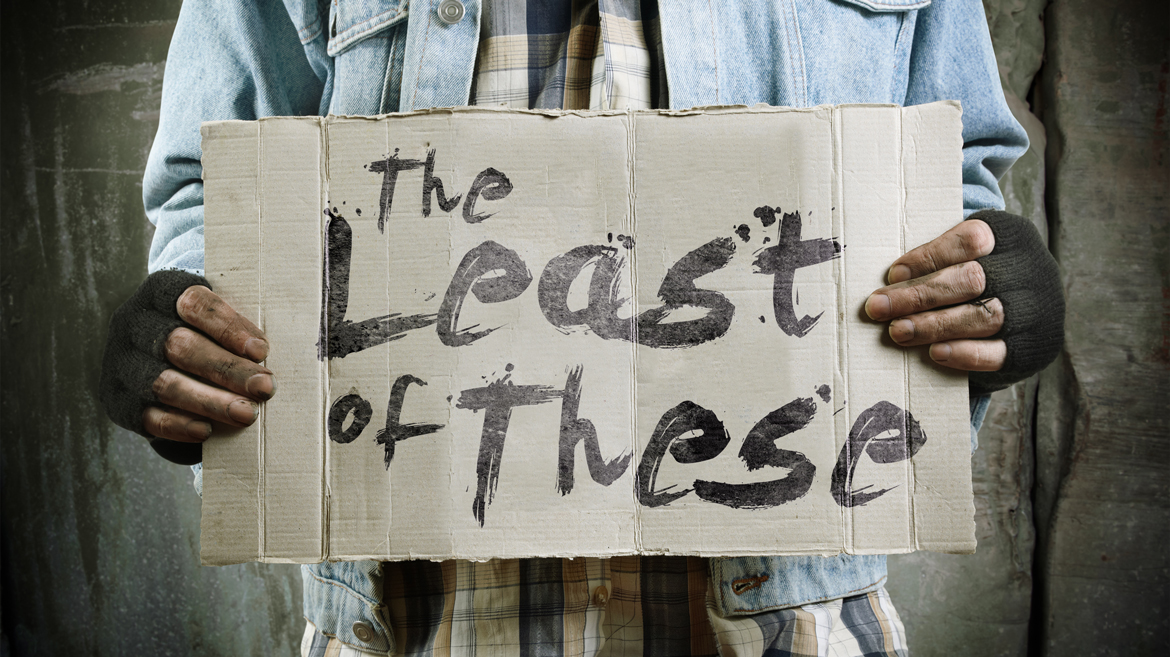Whilst trying to reacclimatise after my trip to Pakistan earlier in the month I sat in the Cathedral listening to a sermon on the lectionary reading for this week; Matthew 25:31-46. This is commonly known as ‘the parable of the sheep and the goats’ and there is a culturally accepted interpretation and usage of this imagery and language from this famous passage. The interpretation goes as follows:
Jesus/The Son of Man will return and judge us all dividing us like a shepherd divides the sheep and the goats. On one side will be the people who did good deeds; fed the hungry, gave a drink to the thirsty, welcomed the stranger, clothed the naked, took care of the sick and visited the prisoner. On the other side those who did not do these acts of charity. When judgement is passed both sides are surprised by their placement asking the judge, “when did I do/not do these things?” The response will come, “When you did it to one of the least of these who are members of my family, you did it to me.” The moral message, so the usual moralistic sermon goes, is that we should do all of these things and be judged righteous by Jesus/The Son of Man.
I have historically always had issues with this reading of the text as it sounds to my protestant ears too much like righteousness by good works. It is a little too karmic for my theological comfort zone. I will be judged by God not by my total dependence on Jesus’ righteousness which he gives me by faith alone but by the charitable deeds I did. Ok, I get it, faith without works is dead and meaningless but I just hope that on the day of judgement I my worthiness of the Kingdom of God is not, in anyway, dependent on my outward acts. Who could stand?
Listening through the filter developed during my time in Pakistan I found myself asking why does my culture focus solely on the actions of those who are being separated; those who have the means and choice to care or not for others? Why do we presume ourselves as those being judged in this narrative? I found myself asking, “but who are ‘the least of these who are members of family’?”

Ian Paul explores this very theme in his regular sermon notes found here. Listening to the same message proclaimed and taught whilst still wrestling with this challenging instinct that the Church in the West is overindulged, coddled and spoilt I was surprised by wanting to be judged not as a sheep/righteous or a goat/unrighteous but, in this image of the final judgement of being safely named ‘a member of Jesus’ family.’ Even if this means that I will be hungry, thirsty, estranged, naked, sick and imprisoned. Again, I found myself so yearning for a more costly discipleship.
But before all this occurs, they will arrest you and persecute you; they will hand you over to synagogue and prisons, and you will be brought before kings and governors because of my name. This will give you an opportunity to testify… You will be betrayed even by parents and brothers, by relatives and friends; and they will put some of you to death. You will be hated by all because of my name. (Lk 21:12-13,16-17)
If the world hates you, be aware that it hated me before it hated you. If you belonged to the world, the world would love you as its own. Because you do not belong to the world, but I have chosen you out of the world—therefore the world hates you. (Jn 15:18-19)
Reading this biblical text alongside the persecuted Church makes me check my cultural privilege and demands the question, why is that the popular reading of the text in the West? Is it not because, even wanting to be virtuous and judged well, we, in fact, prove our own brokenness and addiction to the karmic way of the world? Even as we speak of grace with our lips we betray it with our actions.
Don’t get me wrong, I think doing all the righteous acts of kindness towards those who suffer is good and correct but what if there is a challenge to us in the West to hear not how we are to look out for and welcome the poor and needy but how we are to be poor and needy. To not seek to be a Church for the poor but of the poor. To work to identify ourselves not primarily as people who have power to welcome and include but to identify ourselves as those who will be hated by the world.
I return again to the Shane Claiborne quote which comes to me whenever I hear fellow Church leaders talk about missional relevance to justify certain actions in order to earn morally righteousness in the eyes of wider society.
We are cultural refugees. The beautiful monastics throughout church history were cultural refugees; they ran to the desert not to flee from the world but to save the world from itself… Much of the world now lies in ruins of triumphant and militant Christianity. The imperially baptized religion created a domesticated version of Christianity – a dangerous thing that can inoculate people from ever experiencing true faith. (Everyone is a Christian, but no one knows what a Christian is anymore.) Our hope is that the postmodern, post-Christian world is once again ready for a people who are peculiar, people who spend their energy creating a culture of contrast rather than a culture of relevancy.
Shane Claiborne, ‘Jesus for President: politics for ordinary radicals’ (Michigan: Zondervan, 2008) p. 238-240

